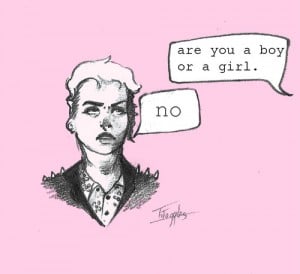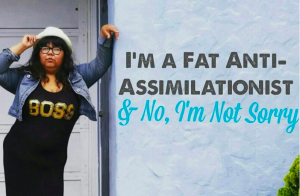
Shutterstock
Originally published on Fem2pt0 and cross-posted here with their permission.
Like most women, I believe my male friends to be nice people. They don’t catcall or sexually harass women on the street, they are thoughtful and sweet, and they believe in women’s equality and gender justice like good progressives.
And so I give them on break on chivalry, because I know that they don’t mean anything by it. They aren’t intending to be disrespectful, to deny women their agency, or to make assumptions about our abilities. They’ve just been trained in a social construct that devalues women, in the same way that we all have.
Even if you weren’t born and raised in the American South, chivalry is deeply ingrained in our behaviors. It is exceptionally rare that a man will walk into or out of an elevator before me. In fact, I’ve noticed that I’ve gotten used to it. When the doors open, I immediately start walking in or out without a second’s thought as to why I am automatically, almost subconsciously, determining that I am the more important person and should have the right to go first. Realizing this, I am actually starting to enjoy the very startled look on men’s faces as I don’t step forward first, or even (heaven help them), say “after you” and wait for them. Just as I’ve become accustomed to receiving chivalry, men have become accustomed to extending it.
Why? Because it’s what nice boys do. What good men do.
Which is exactly why chivalry is dangerous. Because it blankets itself as courtesy while concealing a dramatic assertion of inequality between the sexes. There’s no way around it – chivalry is about viewing women as fragile, delicate creatures who need special protection, special consideration, and special treatment. Chivalry sets women upon a pedestal.
As with most gender relations, the problem lies in the power differential. The woman may be on the pedestal, having doors opened, chairs pulled out, and meals paid for. But actually it is patriarchy that is asserting its power. How? Simple. The woman may be on the pedestal, but it is the privilege of men that has put her there.
And that’s why chivalry needs to die. A horrible, painful, loud and dramatic death is what I’m envisioning here. Something fiery. With an explosion of some sort. Something where people say: what on earth was that?!
Because here’s the thing: there is a difference between being chivalrous and being nice. Being nice is expressing or demonstrating consideration for another person – something that I agree all people should do for all other people. Holding doors open for people, for example, is being nice. Allowing someone else to go in front of you in an elevator, picking up something someone has dropped – these are all nice things to do for others, regardless of gender. Holding a door open for a woman because she’s a woman is not just being nice – it’s being chivalrous. It means that for some reason you believe a woman deserves this extra courtesy. That she is special.
Unfortunately, too many women push back at the idea that chivalry should die. Why? Because we’ve gotten used to it – even the subtler forms of it. We like the special attention. We appreciate that men offer us seats on a crowded bus, that doors seemingly magically open in front of us, that strangers are willing to help us with our luggage. Because society has taught all of us that women are ladies – princesses even – and we shouldn’t have to do such things as manual labor. We enjoy not having to pay a $10 cover at a club whilst our male friends pony up the dough, and we like that men will rush to help us if we are lost or seemingly unable to fend for ourselves. Chivalry has many short term benefits for women.
The idea of chivalry being a behavioral pattern that is limited to men extending special courtesies to women is a fairly narrow and relatively modern definition of the word. Originally, chivalry referred to a code of honor – an entire, much more complete and complex way of life to which knights in medieval England were bound. Alex Davis, lecturer at University of St. Andrews and author on the subject of medieval chivalry, writes:
The Knight’s Code of Chivalry was a moral system that stated all knights should protect others who can not protect themselves, such as widows, children, and elders. All knights needed to have the strength and skills to fight wars in the Middle Ages. Knights not only had to be strong but they were also extremely disciplined and were expected to use their power to protect the weak and defenceless. Knights vowed to be loyal, generous, and “noble bearing”. Knights were required to tell the truth at all times and always respect the honour of women. Knights not only vowed to protect the weak but also vowed to guard the honour of all fellow knights. They always had to obey those who were placed in authority and were never allowed to refuse a challenge from an equal. Knights lived by honor and for glory. Knights were to fear God and maintain His Church. Knights always kept their faith and never turned their back on a foe. Knights despised pecuniary reward. They persevered to the end in any enterprise begun. The main vow from the knights was that they shall fight for the welfare of all.
So yes, preserving a women’s honor was part of the code, but it certainly wasn’t the defining feature. Chivalry was a code wherein a knight promised to defend and protect the weak, the helpless, and the vulnerable. To act graciously, to be generous and truthful. Frankly, these are traits that I think all honorable people should strive for – not just men. And such behavior is certainly not mutually inclusive with special protection and courtesy for women.
This is a question that is posed often – that of special protection for women. Not about opening doors, but instead, about diverting time and money and resources specifically to women. Can we have it both ways? Are women in need of special protection and therefore deserving of special privileges, or aren’t they? Are women victims or agents?
The answer is – both and neither. There are indubitably times when women need special consideration. Why? Because women are uniquely targeted or affected under specific circumstances. Women are specifically targeted for rape and sexual assault and other forms of gender based violence, most especially during times of war. Women’s health needs globally are far greater than men’s as maternal death rates and reproductive health is rivaled by nothing that affects men at that breadth and scope. And so there are times when women are special, and do need special consideration.
That said, if women are not especially affected, there is no reason for women to expect or be granted special protection or consideration. The old idea of sending “women and children first” to safety is absurd and insulting. A sinking cruise ship doesn’t target women anymore than it does Turks or redheads or musicians. Children can be and should be deemed a special class of vulnerable peoples, just as the elderly and sick. Women should not be.
And it isn’t just a vague notion of “society” or “pop culture” that encourages chivalrous behavior. Men offer chivalry to women as well because too many women expect, or even demand it. Too many women are too harsh to too many men, who at this point don’t know what to do when it comes to the proper or most appropriate way to treat women. Some women are downright offended when men don’t open doors for them, pull out chairs, offer their seats, or pay for meals. Then again, some women accuse men of being sexist jerks when they are afforded such courtesies. So it’s important to realize just how hard these gendered expectations are for all of us – men and women alike.
One way to conquer this challenge is for women to stop holding men to such absurd standards – most of them are doing the best they can (just like the rest of us) to navigate tricky waters. There’s no need to throw the ‘sexist’ label on them, nor to berate them for not treating you with special respect. But the second way is for all of us to stop expecting men to be exempt from needing special protection or consideration themselves.
What do I mean by this? On a post about this same topic over at the Nerdy Feminist, one commenter noted that when he sees a woman struggling with groceries, he’ll offer to help. When he sees a man struggling, he won’t. Why not? Because it would be almost offensive to him. Men are supposed to be big and strong and capable. Men are not supposed to need help or assistance. I could relate to what he was saying, and even more so because I’m a woman. I used to offer help to men all the time – not because I was trying to challenge their masculinity, but because they were struggling with something and frankly, two people are almost always more capable than one person is. They would usually flush, embarrassed that I’d asked, or else laugh it off, brushing me aside with a “thanks, but I think I can handle it.”
I wasn’t offended by the rebuff – I knew what they were thinking. It’s the same thing a lot of men think when I hold the door open for them, or pick up something they’ve dropped, or offer my seat to them on the bus. It’s a challenge to their masculinity, and in public no less, it can be a tad embarrassing for a man. So maybe that’s something we need to work on as well. Encouraging men to ask for help or consideration when they need it. Ensuring that men aren’t always expected to be completely independently capable no matter what. Teaching men and women that it’s ok to need assistance or special consideration sometimes, so long as we’re all playing by the same rules and operating under the same expectations for one another.
We may say that common courtesy is something we should all strive for – being polite and helpful and respectful to each other just because it’s the nice thing to do. But gender constructs and stereotypes – the ones that tell men they should never need help or women that they always deserve princess treatment – are getting in the way. We all contribute, we’re all responsible, and we all need to be more aware.
The chivalric code was written at a time when women’s agency and equality and abilities were not even questioned – they simply didn’t exist. We’ve come so far since then. Isn’t it time we updated the meaning of the word chivalry to consider the autonomy and capabilities of women that we’ve fought for so long to be recognized? Isn’t it time women gave up the benefits of chivalry for our right to be treated as capable beings?
[do_widget id=‘text-101′]
Abigail Collazo is the previous Editor for Fem2.0 and worked as a Project Manager at Turner Strategies, where she managed digital strategy. Abigail has worked on women’s issues in the nonprofit and government sectors for 10+ years, with a focus on global women’s rights. She has a BA in Political Science from Mount Holyoke College and an MA in Global Security Studies from Johns Hopkins University. Abigail tweets from @LeftStandingUp.
Search our 3000+ articles!
Read our articles about:
Our online racial justice training
Used by hundreds of universities, non-profits, and businesses.
Click to learn more





















